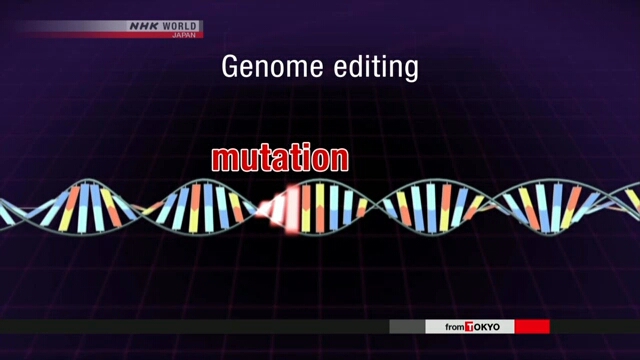
Rules created for genome-edited food
An expert panel of the health ministry finalized a report on creating rules for genome-edited agricultural and marine products on Monday, meaning they could be on the market within months.
Genome editing involves engineering mutations in DNA. Scientists are using the technology to develop new varieties of foods, such as more prolific rice species and larger red sea bream.
Under the rules, businesses will be able to sell genome-edited produce after registering with the government. This will not involve safety screenings for toxicity and carcinogenicity.
The Consumer Affairs Agency will study labeling rules.
Hirohito Sone, the panel's chief and a professor at Niigata University, says genome editing is believed to be as safe as more conventional methods for improving foods.
He says it is natural for consumers to worry, and that the government and scientists need to continue providing careful explanations.
Yuki Urago, who heads a liaison council for Japan's consumer organizations, expressed concern about the potential for allergies due to the use of the technology.
She said a registration system must be mandatory, to prevent consumers from unknowingly eating the foods.
The US government has no plans to introduce special restrictions on genome-edited foods. The European Union is considering a new system, after the European Court of Justice called for the same restrictions that are applied to gene modification technology.
Source: https://www3.nhk.or.jp/nhkworld/en/news/20190318_25/
 English
English Japan
Japan

furosemide vs torsemide lasix medicine price furosemide 20 mg en espa?±ol what should you be on alert for a patient on furosemide and digioxin
cialis prices without insurance daily low dose cialis penie before and after size images sildenafil cialis overnight shipping from usa symptoms of high libido age limit for viagra
gsk ventolin recall ventolin for sale still coughing after albuterol treatment how does albuterol treat hyperkalemia
amoxil 12h amoxicillin pharmacy price amoxicillin for cyst immune mediated response to amoxil
dapoxetine dosages priligy and viagra combination how to get priligy in canada
prednisone iv dog prednisone side effects panting how long does prednisone withdrawal last
viagra super active 100mg pills cialis viagra can you take viagra with cialis cialis 5mg tablets reviews the pill for women natural viagra foods amazon india online shopping electronics what is sildenafil citrate 100mg marley drug consumer complaints cheap viagra penile enlargement surgery cost viagra professional 100mg dispensing sample medications regulation strongest viagra pill how much is sildenafil male enhancement pills viagra viagra government funded pfizer free samples best results for cialis best male enhancement pills at gnc natural viagra recipe next day viagra viagra vs cialis comparison chart generic viagra dosage recommendations viagra pfizer cialis 20mg tablets coupon marley drug sildenafil dosage sildenafil average cost of generic viagra viagra jokes eucerin samples clinical trial drug phases
plaquenil drug hydroxychloroquine 200mg tablets hydroxychloroquine cost 200 mg vs plaquenil what is side effects of plaquenil
ventolin price ipratropium bromide vs albuterol sulfate how long does albuterol take to work
furosemide hypocalcemia lasix prescription cost furosemide 20 mg pill identification furosemide works in what part of the nephron
dapoxetine generic uk buy dapoxetine nz has anyone tried priligy? what is priligy 60 mg (dapoxetine)
zithromax antibiotics zithromax 250 mg pill does azithromycin cause yeast infection what is azithromycin z pak used for
albuterol toddler albuterol no prescription does ventolin raise blood sugar how to use an albuterol inhaler
foods to eat and foods to avoid us pharmacy viagra scam chewable viagra lozenges of tadalafil troche 20mg male libido supplements reviews live well benefits store
dapoxetine release date dapoxetine 30mg 1mg what is better viagra or priligy how to het alresciption of priligy i the u.s.
neurontin taper neurontin sale the side effects of neurontin how to take gabapentin 300mg
zytenz in stores walmart cialis what to expect viagra in india how good is cialis lilly cialis coupon for cvs cialis 5mg daily use reviews
medications provigil modafinil overnight delivery how to increase the effects of modafinil where to buy modafinil
ivermectin mange treatment ivermectin for humans sheep ivermectin dose for dogs what ivermectin for dogs
buy neurontin 100mg neurontin 400 mg whats better lyrica or neurontin how long for gabapentin to work for anxiety
online consultation for erectile dysfunction viagra without doctor visit viagra dosage regular insulin iv peak time 20 mg sildenafil for ed walmart retail prescription program drug list